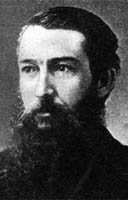
Sidney Lanier
Sidney Lanier (February 3, 1842—September 7, 1881) American poet, musician and critic, born in Macon, Georgia, into a distinguished Southern family, Lanier developed strong musical interests in childhood. He attended Oglethorpe College (1856—60). After graduation, he served in the Confederate Army until his capture and imprisonment at Point Lookout, Maryland where he contracted tuberculosis. Returning to Macon, Lanier published his first book, the war novel Tiger Lilies (1867), and in the same year married Mary Day. After a brief stay in Texas, the Laniers moved to Baltimore (1873) where Sidney obtained a position as first flutist with the Peabody Symphony Orchestra, produced several potboilers for juveniles and gained national recognition for his poems, which appeared in magazines and were first collected in 1877. Lanier’s verse, which includes Corn, The Symphony and The Marshes of Glynn, is noted for its ornateness and melodic qualities. From his work as lecturer in English literature at Johns Hopkins University (1879—81) came The Science of English Verse (1880), a prose treatise on the relation of poetry to music, and The English Novel (1883). Most of Sidney Lanier’s best verse was written during his last years, but no book publication of his late poems appeared until the year after his death, in 1882.






